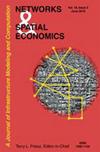近代中国农村人力资本研究
IF 1.5
3区 工程技术
Q3 OPERATIONS RESEARCH & MANAGEMENT SCIENCE
引用次数: 0
摘要
本文的目的是分析当前经济发展阶段中国农村人力资本积累过程的实际理论和实证研究结果。中国仍然是一个在农村生活和工作的人口占很大比例的国家。这就是为什么这些地区和整个国家经济发展的可持续性在很大程度上取决于中国农村劳动力资源发展的特殊性。农村人力资本积累过程在中国经济社会政策和解决“三农”问题中发挥着重要作用。人力资本积累的过程受三组相互关联的因素的影响:中国特色城市化、生活水平和质量、基础设施和社会制度环境。对这些因素的影响进行综合分析后得出的结论是,在自由市场关系、城市化和收入分化发展的背景下,对中国农业部门和农村地区的公共投资的基本增加不足以确保经济可持续发展和解决这一问题的条件。只有为人力资本的积累提供有效的基础设施和有利的社会制度环境,人力资本在中国农村地区发展中的作用才会增强本文章由计算机程序翻译,如有差异,请以英文原文为准。
Human Capital of Rural Regions of Modern China
The purpose of the article is to analyze the results of actual theoretical and empirical studies of the process of accumulation of human capital in rural regions of China at the present stage of economic development. The PRC is still a country with a large proportion of the population living and working in rural regions. That is why the sustainability of the development of these regions and the country’s economy as a whole is largely determined by the peculiarities of the development of the labor resources of Chinese villages. The process of accumulation of human capital in rural regions plays an important role in China’s economic and social policy, as well as in solving the problem of ‘sannun’. The process of accumulation of human capital is influenced by three groups of interrelated factors: urbanization with Chinese characteristics, the level and quality of life, infrastructure and socio-institutional environment. The results of a comprehensive analysis of the influence of these groups of factors led to the conclusion that an elementary increase in public investment in the agricultural sector and rural regions of the PRC against the background of the development of free market relations, urbanization and income differentiation is not enough to ensure conditions for sustainable economic development and solving this problem. The role of human capital in the development of rural regions of China will increase only with the provision of opportunities to create an effective infrastructure and a favorable socio-institutional environment for its accumulation
求助全文
通过发布文献求助,成功后即可免费获取论文全文。
去求助
来源期刊

Networks & Spatial Economics
社会科学-运筹学与管理科学
CiteScore
4.00
自引率
4.20%
发文量
26
审稿时长
>12 weeks
期刊介绍:
Networks and Spatial Economics (NETS) is devoted to the mathematical and numerical study of economic activities facilitated by human infrastructure, broadly defined to include technologies pertinent to information, telecommunications, the Internet, transportation, energy storage and transmission, and water resources. Because the spatial organization of infrastructure most generally takes the form of networks, the journal encourages submissions that employ a network perspective. However, non-network continuum models are also recognized as an important tradition that has provided great insight into spatial economic phenomena; consequently, the journal welcomes with equal enthusiasm submissions based on continuum models.
The journal welcomes the full spectrum of high quality work in networks and spatial economics including theoretical studies, case studies and algorithmic investigations, as well as manuscripts that combine these aspects. Although not devoted exclusively to theoretical studies, the journal is "theory-friendly". That is, well thought out theoretical analyses of important network and spatial economic problems will be considered without bias even if they do not include case studies or numerical examples.
 求助内容:
求助内容: 应助结果提醒方式:
应助结果提醒方式:


